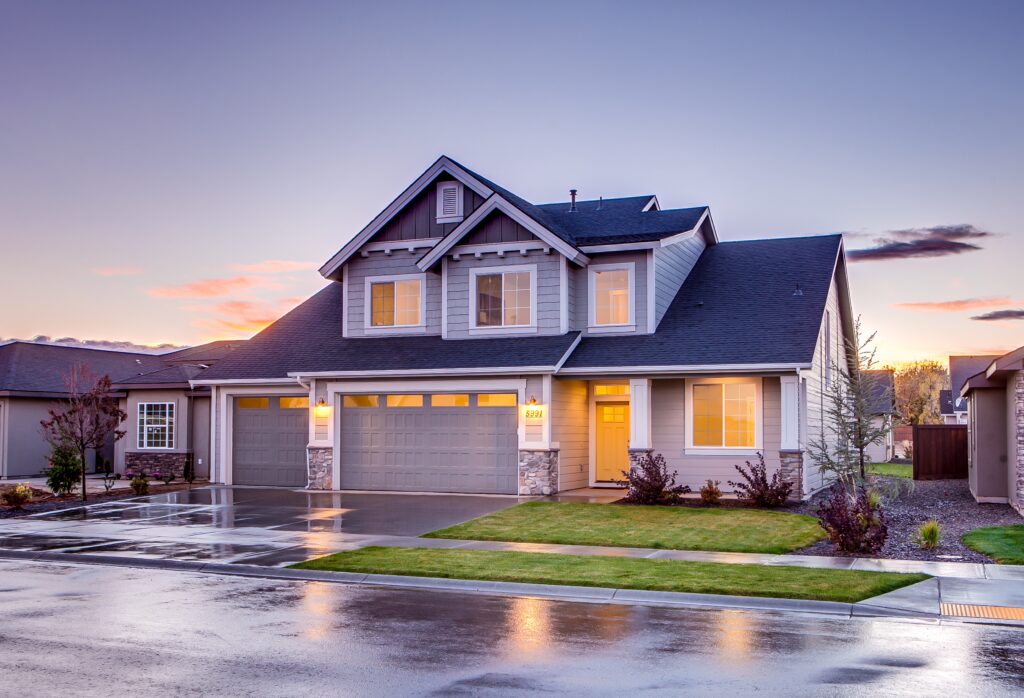One word that has caused me a lot of confusion in my German journey was “house” or “home.” Usually, English words have similar counterparts in German. However, I always had trouble knowing how to say home in German.
Zuhause? zu Hause? das Zuhause? daheim? das Heimat? das Haus? nach Hause? die Häuser?
My confusion partly stems from the strange treatment of this word in English, but German also has some unique ways it handles this word. There are many situations that are very different that all use the word “home” in English, so we need to unravel those in order to clearly see what German is doing with that general concept.
“Home” as a location
In English, there is a specific group of words that (almost) never take prepositions. They derive from nouns, but with time they have become adverbs that sound wrong with “to” or “at.” This group includes things like upstairs or downtown. The important one for today is “home.” If someone asks you where you are in English, you can reply “I’m home.” It does not mean you are a house; it means you are located at your house.
If you want to say “I am home,” in German, you will use “zuhause.”
Wenn du krank wirst, solltest du zuhause bleiben.
= If you get sick, you should stay (at) home.
Ich verlasse mein Auto zuhause, und du wirst mich zur Arbeit fahren. Klingt das gut?
= I will leave my car at home, and you will drive me to work. Does that sound good?

Then what is “daheim”?
“Daheim” is used in the exact same way as “zuhause,” an adverbial location for home. The difference is that it is more typical for southern Germany. It’s not my job to say whether or not to use this word, but this word is slowly disappearing in standard Hochdeutsch. This article shows an unscientific survey where most respondents say they prefer “zuhause” over “daheim,” and this article attributes “daheim” to southern-style German.
zuhause oder zu Hause?
These two forms are used in identical ways; they are both used to talk about location, probably with bleiben or sein.
Working from home
This expression work “from home” that has become very common in the recent years uses von + “zuhause” + aus. This makes sense on a grammatical level because “from home” uses “from,” meaning a separate location, and “zuhause” a location.
Das Unternehmen lässt die Angestellter, zu entscheiden, ob sie von zuhause aus arbeiten wollen.
= The company lets employees decide whether they want to work from home.
Home as a noun
If you add any article or adjective to “home,” you are probably dealing with a noun. In this German situation, you will use the noun das Zuhause. It was confusing for me when I first heard it because that “zu” was originally a preposition that attached itself to a noun, creating a Frankenstein-noun, which German loves. The meaning is the same as English “home,” meaning the residence where you feel comfortable.
In unserem Zuhause ist es eine Regel, dass man seine Schuhe auszieht, wenn man betritt.
= In our home it is a rule that you take off your shoes when you enter.
Ich vermisse mein Zuhause.
= I miss my home.
This video and article also explain the difference between Zuhause, zu Hause, and zuhause in full German. This website also has a lot of good German differences, which can be helpful for German learners if you already are advanced enough to understand full German explanations.
Home as a direction
As I mentioned, “home” is one of the words that does not need “to” in English. We “go home,” and we “come home” without “to.” In German, this is probably going to be “nach Hause.” This is paired with the most common movement verbs “gehen,” “kommen,” or “fahren.”
Ich höre einen Podcast an, wenn ich nach Hause fahren.
= I listen to a podcast when I drive home.
Die Kinder sind um 14 Uhr nach Hause gekommen.
= The kids got home at 2pm.
Any preposition that is not “to”
Although “nach Hause” is the basic preposition you will use most of the time with the most common movement verbs gehen and kommen, any other preposition can be combined with “das Haus” if you need to specifically mention direction. This will usually be combined with nouns or special verbs that are picky about their prepositions.
Direkte Lieferung ins Haus ist nicht verfügbar in meinem Land.
= Direct home delivery (direct delivery into the home) is not available in my country.
Home as a territory or country
The word das Heimat in German translates more precisely to “homeland” in English, but we could also use “home” in English, which is why I include it here.
Wegen des Krieges müssen die Menschen ihre Heimat verlassen.
= Because of the war, the people must leave their home(land).
Das Heimat, das du dich erinnerst, hat nach 50 Jahre verändert.
= The home(land) you remember changed after 50 years.
House as a building
Like in English, das Haus (plural die Häuser) is the building we live in. While das Zuhause is more emotional and warm and fuzzy, like your home, das Haus is the most basic word representing the building.
Ich hätte lieber ein Haus mit vier Schlafzimmern.
= I would prefer a house with four bedrooms.
Ich brauche Hilfe beim Streichen meines Hauses.
= I need help painting my house.

Summary
- zuhause: home (location) / “at home”
- zu Hause: home (location) / “at home”
- daheim: home (location) / “at home” (Southern-style German)
- das Zuhause: home (noun)
- nach Hause: home (direction) + gehen, kommen, or fahren
- preposition + [correct noun case of das] Haus: unique direction of home (usually combined with a noun or specialized verb)
- das Heimat: homeland (noun)
- das Haus / die Häuser: house (noun), the literal building without the emotions of “home”
Those are all the ways to use the word that roughly translates to “home” in English. English may be tough for some learners, as I have written about many times on this site, but this is one of the ways that German is much more complex than English.
If you want to see more German explanations, I have more on this site that can help you improve your German.
I also have some language-learning content on my YouTube channel, which you can see here.
Hopefully, this helps you on German journey and now you know how to say home in German. Viel Glück!